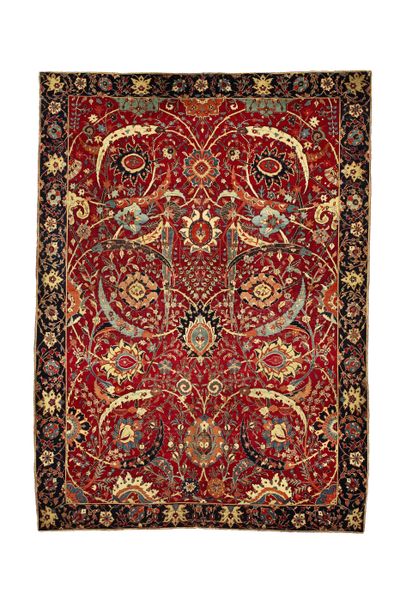Record-setting sale of rug inspires imagination

NEW YORK – The stunned crowd at Sotheby’s burst into a rare round of applause when a museum-quality Persian carpet sold for a record-setting $33.76 million in June.
“It was extraordinary and wonderful and the carpet deserved it,” said the auctioneer, Mary Jo Otsea, Sotheby’s senior consultant for rugs and carpets. The hand-knotted, 17th century Clark Sickle-Leaf carpet, with a red ground and dark blue border, is “still dazzling to the eye,” she said.
While few of us can fathom spending so much money on a showpiece, Oriental carpets, made in countries from Turkey to China, are available at various prices and have long been a popular part of home decor.
“Older carpets look great with everything,” Otsea said. “They add great warmth by their color and design. Older carpets have a wonderful patina and character that you can’t capture in a new piece. Each one is different. You’re not going to see the same thing when you go into everyone’s house.”
Doris Athineos, the arts and antiques editor for Traditional Home magazine, said the sale of the Clark Sickle-Leaf carpet may inspire people to look at the carpets with a new eye, mindful that an eight-figure sum was just shelled out for one of the finest examples.
“It gives them confidence to pull the trigger on something they may be eying, and confidence if they’ve inherited them from a great aunt or have them rolled up and stored. They might think, ‘Hey maybe I should put that out,”’ Athineos said.
Whether antiques or reproductions, the carpets work well in any kind of house or with any kind of decor, she said.
“I can’t imagine where a beautiful antique carpet wouldn’t work,” Athineos said. “I have seen them in every kind of home from minimalist to maximalist, where there’s lot of decoration in the house. They add warmth to very pristine, minimalist spaces.”
Try one in any room except the kitchen, Athineos recommends, especially the space where people spend the most time, perhaps the media room.
“That’s the kind of wear those carpets can take,” she said. “They’re meant to be walked on.”
With so many styles of design – florals, geometrics, abstracts – Otsea recommends browsing through as many carpets as possible to find out what you like. A great carpet, she said, is the right combination of color, design, technique and tradition.
“The more you look, the more you realize what you like,” she said. “There’s a whole world of patterns to choose from and color palettes as well.”
Athineos advised going to a reputable store, not one that’s constantly promoting a going-out-of-business sale. Ask about the return policy, as some stores allow you to buy and try, and return it if it doesn’t work.
“Sometimes you don’t know until it’s laid out, the way the light falls on the carpet,” she said.
If you are shopping for a machine-made reproduction carpet, Athineos suggests bringing a damp, white cloth. Part the pile and rub the cloth against the carpet to make sure no color comes off; that bleeding is the sign of a cheap carpet, she said, that won’t last two years.
“Reproductions can be great, but this is a carpet you do not want,” she said.
Don’t get too hung up on a carpet’s size, Athineos said; buy what you love and find a way to work it into your home.
Try the layered look, she suggests, with one carpet overlapping another.
“You should take the size equation out of it,” she said. “Persian carpets aren’t about an exact size to fit the room.”
With 61,000 carpets to choose from at New York’s ABC Home & Carpet, the company’s vice chairman, Graham Head, advises people to buy pieces they feel emotionally attached to, much as they would a painting.
“It’s got to speak to you, otherwise don’t bother,” he said.
Carpet buying is an art, not a science, he said, and shouldn’t be over-analyzed.
“If it makes you smile and you come home at night and open the door with a little bounce in your step, and you’re happy to be home with the rug, then that’s a good buy,” he said. “If you’ve done it by some mathematical equation, it doesn’t have the same soul to it. It should be predictably unpredictable.”